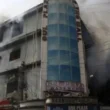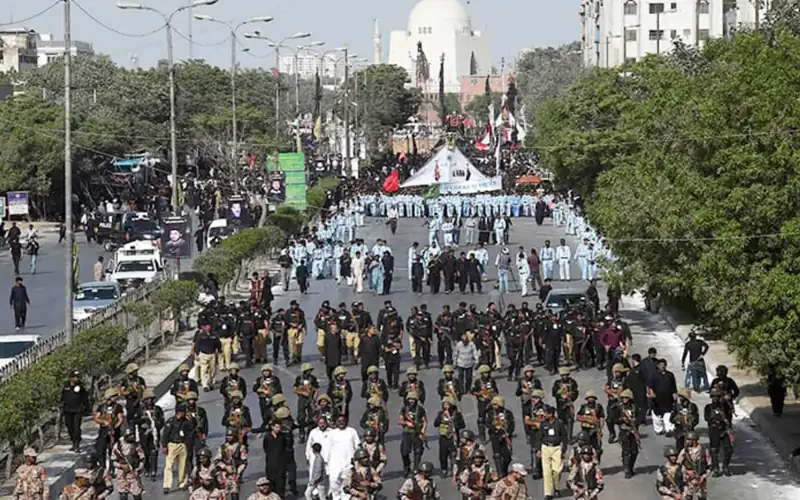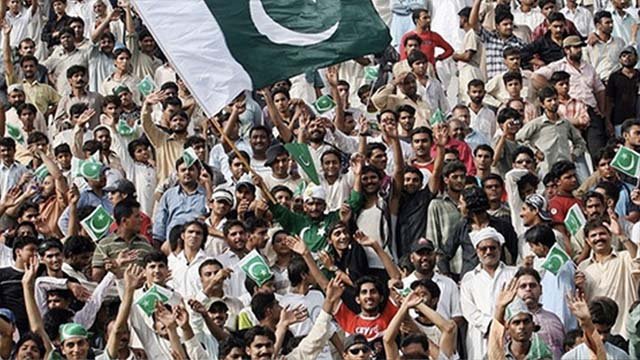The Sindh Home Department has officially released Muharram 2025 security instructions for all divisional and district administrations, police units, and law enforcement agencies.
The notification strictly directed all departments to prevent sectarian conflict and prohibited activities, including unauthorized processions, route deviations, wall chalking, and public display of provocative material. Only pre-approved routes and events are allowed.
The provision of basic civic services must be ensured without interruption. These include continuous electricity supply, clean drinking water, street lighting, and proper sanitation – especially along procession routes and around religious venues.
Unregistered or unsecured processions will not be permitted. All gatherings must have coordinated security arrangements in place. Firebrand speakers’ movement and speeches will be monitored under prior government notifications.
The use of loudspeakers is to be strictly regulated under the Sindh Sound System (Regulation) Act 2015. Any violations, including distribution of provocative audio or visual material, will result in legal action.
All SSPs must send daily reports of enforcement from 1st to 10th Muharram. District control rooms are to be activated by commissioners and DIGs for real-time law and order monitoring and quick incident response.
Religious institutions have been instructed to employ scouts and private security, and submit lists of volunteers to SSPs for background verification. Peace Committees at all levels must be reactivated and made functional.
Parking lots will be designated away from gathering points. Bomb disposal squads must check these areas ahead of time. Body searches by police, civil defense, and verified volunteers are to be carried out at every entry.
The Health Department will inspect and approve all Sabeels along procession routes. Public health officers must be assigned to prevent health risks caused by contaminated water or improper hygiene practices.
A comprehensive three-tier security cover will be established for all processions and gatherings. Female police and lady volunteers will be stationed to assist and ensure safety of women mourners.
Sensitive areas will be monitored through rooftop deployments, mobile patrols, and snap-checking. Static pickets and rooftop surveillance will be installed in high-risk locations with direct coordination from intelligence agencies.
All procession routes and key Imambargahs must be technically swept, cleared of debris, and sealed until events conclude. Nearby markets must remain closed and inspected for suspicious materials.
CCTV cameras, anti-riot equipment, jammers, scanners, and fire extinguishers must be functional and deployed. Hotels along routes must be monitored and verified to prevent unlawful activity or misuse.
Pre-positioned police and Rangers troops must secure major venues. Special attention is to be paid during dispersal times after gatherings. Ambulances and fire brigades must be on standby in nearby central points.
All government hospitals are instructed to remain on high alert. Sufficient medical staff, emergency supplies, and blood bags must be made available throughout the month, including Chehlum and Chup Tazia.
Inter-agency coordination is mandatory. Police, Rangers, and intelligence units will conduct joint flag marches between 1st and 7th Muharram. Law enforcement personnel are directed to act professionally and respectfully.
Jammers must be placed along sensitive routes. Special Branch and CTD will lead combing operations in coordination with intelligence agencies. Areas with history of sectarian tension must be given high-priority monitoring.
Updated lists of sensitive Imambargahs and troubled spots must be submitted to Deputy Commissioners and SSPs immediately for coordinated planning through District Intelligence Committees.
Media communication must be handled only by designated officers under government policy. Monitoring of banned outfits and individuals under the 4th Schedule of the Anti-Terrorism Act must be enforced without exception.
All departments have been directed to stay on high alert, maintain continuous coordination, and keep the Home Department informed of developments. The Sindh Government emphasized strict compliance with these instructions.












